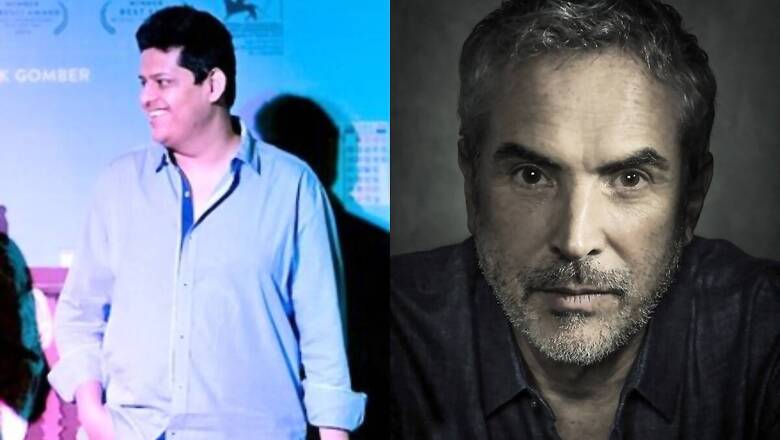
views
It feels like a dream, says Court director Chaitanya Tamhane on Oscar-winning filmmaker Alfonso Cuaron's decision to board his second film The Disciple as executive producer just after it was selected for the main competition of the Venice Film Festival.
The Marathi language film, which looks at the world of classical musicians on the fringes of success, is the first Indian movie in 20 years to be chosen for the main competition of a European film festival (Cannes, Venice, Berlin) after Mira Nair's Monsoon Wedding in Venice in 2001.
The Disciple has also been selected for the Toronto International Film Festival. "This is one of those life in dream kind of situations," the 33-year-old filmmaker told PTI in a phone interview.
Tamhane, feted for his impressive debut in the Marathi film Court, almost Kafkaesque in its depiction of the Indian legal system, describes as "surreal" the feeling that someone of Curaon's stature has shown faith in The Disciple. That the Venice Film Festival has endorsed his cinema for a second time has added to the feeling.
Court, his multilingual debut, was screened in the Orizzonti (Horizons) category in the Venice festival and won Tamhane the best film-Orizzonti award and the Lion of the Future award. Orizzonti runs parallel to the main festival and showcases the best of 19 international films. Tamhane met Cuaron through the Rolex mentorship programme while the Mexican director was working on his black-and-white multiple Oscar-winning classic Roma (Best Foreign Film, Best Director and Cinematography).
The programme finished two years ago but Cuaron decided to lend his name to Tamhane's film and praised him as "one of the most important new voices of contemporary cinema". "It's surreal that someone of his stature has shown faith in the film. It changes the profile of the film and gives it international attention because Alfonso is involved. I'm super excited but I also feel a sense of responsibility," Tamhane said when asked about his connection with the director of international classics such as Gravity, Children of Men and Y Tu Mama Tambien.
Tamhane said being on the sets of Roma and watching Cuaron work changed him as a filmmaker. Discussing the challenge of balancing the learning while also maintaining his individuality as a filmmaker, Tamhane said Cuaron was very respectful of his creative process and the fact that their worldview and filmmaking styles differed.
"I don't think there was any question of him tripping me in a creative way. If anything, he made me more fearless, and helped me to express myself more freely. He has been this enabler in me realising my vision. He has always encouraged me and helped me to aim for the sky and not compromise," the director said. The Disciple is set in the world of classical music but it is not about musicians who draw sold out concerts in big auditoriums, Tamhane said.
"It is about musicians who are on the fringes and are a part of the subculture in Bombay," he said. The story, he elaborated, revolves around an Indian classical vocalist trying to achieve purity in his work as he has been raised on the stories of his father and guru about the masters of the past. Tamhane said he was working on another film when the world of classical music pulled him in. Though not completely familiar with the music, the director said he was always fascinated by the stories and there was a temptation to explore that world cinematically.
"I don't know when I kind of became addicted to that music and that world. It was just a joyful process of immersing myself in it, watching documentaries and meeting people. I would travel to many different cities to meet musicians without any agenda. I started attending concerts. The film evolved organically after I completed my research but till then I was like a kid in the candy store. "This world has evolved over so many centuries in India and has such a rich history with all its contradictions, complexities and challenges. It was a real joy to explore it," he said.
Both Court and The Disciple deal with the passage of time. But while his first movie was "objective and dry", he calls his new film emotional, subjective and even romantic in texture. "This film spans over three decades. It is like watching a lifetime unfolding in front of you," Tamhane said.
After Court, Tamhane said there were offers that would have given him a decent amount of money but he did not want to compromise on his learning. "I feel there is some value in taking your time, being sure of what you are doing and being honest in your process. I am more interested in having a career than money. I feel I am young and I should spend my time doing something that I believe in," he added.
Tamhane grew up dreaming about becoming an actor as that's the most immediate form of self expression at a young age. He was introduced to the world of theatre while studying at Mithibai College in Mumbai. He landed a job as a writer on television shows when he was just 17. The director started to write his own theatre plays and short films by the time he was 19.
"I am still finding my voice and I feel it is going to be a lifelong journey but because I started working from a young age, I made a lot of mistakes very fast. I used to feel guilty about how much time I take to do certain things but now I embrace it, like it is a norm for me to have multiple, 20 to 30 takes. I used to be judged for that but now I tell people, 'Look, I take time because I don't know the answer and I am trying to find it along the way'." Court, which also won a National Film Award, represented India at the 2016 Oscars.




















Comments
0 comment